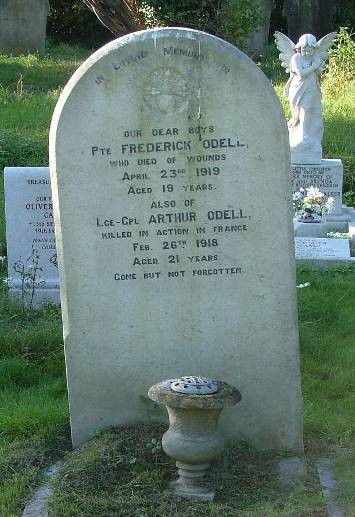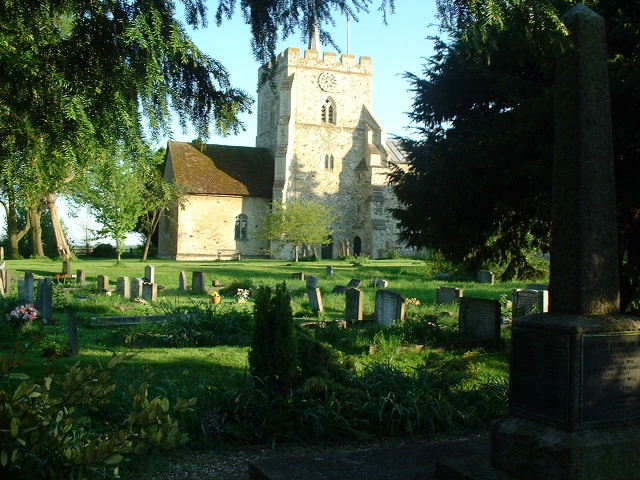Name
Frederick Odell
Conflict
First World War
Date of Death / Age
23/04/1919
19
Rank, Service Number & Service Details
Private
GS/82152
Royal Fusiliers *1
26th (County of London)(Service) Bn.
Awards: Service Medals/Honour Awards
British War and Victory medals
Cemetery/Memorial: Name/Reference/Country
PIRTON (ST. MARY) CHURCHYARD
152.
United Kingdom
Headstone Inscription
Not a CWGC headstone
UK & Other Memorials
Pirton Village War Memorial,
St Mary’s Shrine, Pirton,
Methodist Chapel Plaque, Pirton,
Pirton School Memorial
Biography
In many ways Frederick’s is the saddest story of all the Pirton men who died.
He was born on July 4th 1899 to John and Mary Odell (née Dawson) and baptism and census records reveal eleven children in the family(*1). Like two of his older brothers, James and Arthur, who also served, he went to Pirton School and when war came he had only recently left. He probably went straight to work on the local farms and that is certainly what he was doing when he enlisted. The family home was in Dead Horse Lane - later renamed as Royal Oak Lane and their house was number two.
He saw his brothers James and Arthur enlist in 1914; James in the Navy and Arthur in the Army. Frederick, of course, was too young to follow them at that stage, but on June 16th 1917 he enlisted or was conscripted for the duration of the war and started active service two months later, when he was posted to the 107th Training Reserve Battalion. As his training continued the Battalion changed its name and he was transferred accordingly to the 265th Infantry Battalion, the 62nd Graduated Battalion and then the 52nd Graduated Battalion Royal Fusiliers.
While in training he would have heard of the death of his brother Arthur in France on February 26th 1918. Frederick’s training was completed about a month later and he left Folkestone on April 2nd 1918 and arrived in Boulogne on the same day. On the 3rd he was temporarily posted to the 15th Royal Fusiliers – a reserve battalion and then, the next day, to the 26th. Events were moving fast for Frederick as he joined his unit on the 5th.
The Battalion had originally served in France, but had moved to Italy in November 1917. By March 1918 they were returning to France and they arrived on the 7th. Up to the 20th they were in training. On the 21st they were to march to Saulty Station and then were to move to the Baizeaux area; however at 4:30am on the 21st the Germans launched their major Spring Offensive and so they were ordered to the forward zone instead, where the fighting was fierce. They detrained at Achiet le Grand on the 22nd and then marched to Favreuil, arriving at about 5:30am. From this location they were immediately engaged in operations on the River Somme. Their losses between March 22nd and the 31st were 41 men killed, 146 wounded and 103 missing and they were forced back. On the night of April 1st they were relieved.
On the 2nd they marched to Bienvilliers, where they boarded buses to Halloy and rested there for the night. The next day at 6:30am they marched the eight or nine miles to Mondicourt, then a bus to Bonniéres, some fourteen miles and where they stopped for the night. On the next day, the 4th, they marched to Frévent, 3 ½ miles and took the train to Hopoutre rail head at Poperinge (Belgium), about fifty-three miles and then went by bus to Winnizeele. Here they rested, refitted and reorganised and here Frederick and 419 other reinforcements joined the Battalion.
On the 7th they marched towards the front line. They were resting on the 8th, but at 6:30pm received orders to entrain for Brandhoek. When they arrived, at 8:00pm, they were ordered straight to the front line around Passchendaele. To Frederick, who was just eighteen, new to the Battalion, Belgium and to the war, it must have been exciting and terrifying. On the 9th they had been in battle for about twenty-four hours. Disappointingly the war diary makes no mention of any special events, just ‘Two Companies in the front line, one in support and one in reserve’, but Frederick was hit and it was a terrible wound.
His medical notes from France read ‘Hit in chest just below left of scapula (shoulder blades). Entry wo’ (wound) left side penetrating kidney and lodging in Rt (right?) chest. Wound involving spinal cord almost complete paralysis.’ He clearly was not going to fight again, so when his condition was stable enough he was returned to England and left France on April 17th 1918. The next day he was admitted to the King George Hospital in Stamford Street, London. They gave more details of his condition; ‘Slight sensation in feet . . . General condition poor . . . Troublesome cough . . . flaccid paralysis of the legs . . . . no reflexes . . . bowel incontinence . . . bladder incontinence . . . has a good deal of pain’.
By December he was descried as ‘General condition fairly good . . . marked wasting of lower limbs with a fair amount of movement present . . . incontinent’. Unsurprisingly, they recommended that he be discharged as ‘permanently unfit.’
His official discharge from the army came through on December 11th 1918 – the day that he was discharged from hospital. He was too ill to return home and instead he went to the Star and Garter Home(*2) in Richmond. The Star & Garter had been founded in 1916 following concern from Queen Mary as to how the severely disabled young men returning from the battlegrounds of the war could be cared for on a permanent basis.
They would have done their best for him and despite his serious condition it was said that he maintained a very cheerful spirit and although, quite a distance from Pirton, his mother paid him a number of visits. On April 23rd 1919, one year and fourteen days after he was wounded and five months and twelve days after the war had ended, he lost his personal war and died. His body was returned to Pirton and his burial took place on April 28th.
He was just nineteen and had joined the Army when he was seventeen. He went to France when he was eighteen, spent just one day at the Front and died at nineteen – terribly tragic. The funeral took place amongst the worst snowstorm for years, somehow sadly appropriate, and Frederick was laid to rest in St. Mary’s churchyard.
The Hertfordshire Express dated May 24th 1919 reported his funeral and the events that led to it. It was to be the last death of a Pirton man which was directly attributable to the war. ‘Six Pirton soldiers officiated as bearers¸ and in addition about twenty ex-Service men joined the cortege. Besides the family wreaths, several other floral tributes were received, including one from the Star and Garter, and also one from the lady whose generosity maintained the bed which the deceased had occupied there. There was also a wreath from the Pirton Glove Factory, where the deceased’s sister was employed.’
The paper added details about his death. ‘He was taking water up to firing line, when a German aeroplane swooped down over the line, and began to machine gun the British. While in the act of taking shelter, Pte Odell was shot in the spine.’
Both Frederick and Arthur are listed on the Village War Memorial. Frederick’s headstone in St. Mary’s churchyard remembers Frederick and his brother Arthur:
IN LOVING MEMORY OF OUR DEAR BOYS PTE FREDERICK ODELL WHO DIED OF WOUNDS APRIL 23RD 1919 AGED 19 YEARS ALSO OF LCE-CPL ARTHUR ODELL KILLED IN ACTION IN FRANCE FEB 26TH 1918 AGED 21 YEARS GONE BUT NOT FORGOTTEN.
A terrible end, with perhaps the only consolation being that unlike a million or so other families, Frederick did not lie in a foreign field, but a quiet, traditional, English country churchyard, where family and friends could at least visit at any time they wished.
*1 Jane (bapt 1881), James (b 1883), Martha (bapt 1885), Robert (b 1886), Nellie (b 1888), Frank (b 1890), William (1894), Arthur (b 1896), John (b 1898, died at seventeen), Frederick (b 1899) and Marjorie (b 1902).
*2 The Star and Garter Home received its Royal Charter in 1979 and became The Royal Star and Garter Home.
Additional Information
Text from the book: The Pride of Pirton.
*1 Believed more correctly, (County of London) Bn. London Regiment (Bankers).
Acknowledgments
The Pride of Pirton book – www.pirton.org.uk/prideofpirton Chris Ryan / Tony French / Jonty Wild



